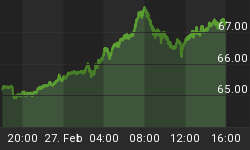The Fed is a corrupt and powerful institution, and Chairman Bernanke is making the global crisis worse. His new speech given last week in Europe was terribly misguided and will upset markets as the Chinese and Germans won't ignore his challenges. Bernanke's interpretations of the markets have been wrong since before he was appointed to head the Fed, and his actions are doing nothing but aggravating the situation.
In this seminal speech, titled "Rebalancing the Global Recovery," Bernanke not only defended QE II as the right policy, but also attacked the monetary policy of China, the biggest holder of U.S. debt, an action that must be understood for how misdirected it is.
Here are a few excerpts from the speech:
On our "tepid" recovery
In sum, on its current economic trajectory the United States runs the risk of seeing millions of workers unemployed or underemployed for many years.
Indeed, although I expect that growth will pick up and unemployment will decline somewhat next year, we cannot rule out the possibility that unemployment might rise further in the near term, creating added risks for the recovery.
On China
The strategy of currency undervaluation has demonstrated important drawbacks, both for the world system and for the countries using that strategy.
... For large, systemically important countries with persistent current account surpluses, the pursuit of export-led growth [i.e., China and its strategy] cannot ultimately succeed if the implications of that strategy for global growth and stability are not taken into account.
On defending QEII as the right policy
Following up on this earlier success, the Committee [i.e., the Federal Open Market Committee] announced this month that it would purchase additional Treasury securities. In taking that action, the Committee seeks to support the economic recovery, promote a faster pace of job creation, and reduce the risk of a further decline in inflation that would prove damaging to the recovery.
Fully aware of the important role that the dollar plays in the international monetary and financial system, the Committee believes that the best way to continue to deliver the strong economic fundamentals that underpin the value of the dollar, as well as to support the global recovery, is through policies that lead to a resumption of robust growth in a context of price stability in the United States.
Mike Shedlock of Mish's Global Economic Trend Analysis provides some sensible criticisms of Bernanke's speech. Shedlock's conclusion: "If Bernanke was trying to spook the markets, provoke China, cause a currency war, and get Congress to launch an extremely foolish set of tariffs, he would have been hard pressed to deliver a more powerful speech."
[Click here for a commentary by Greg Robb from MarketWatch on the implications of Bernanke's criticism of China.]
The basic problem with QE 2 is that printing electronic money does nothing to improve the unemployment situation. Purchasing $600 B of government debt delays the government from having to make tough decisions about its $1.5 trillion deficits for six months and coincidentally gets us from the $13.7 trillion of gross government debt to the legislated debt ceiling of $14.3 trillion that the Republicans are willing to fight over not increasing. Studies show that this kind of policy has little effect on the growth of the economy but hurts the currency.
The bottom line is this: The imbalances that the Fed is forcing on China's central bank are difficult for them to absorb. They will lose money if they value the yuan higher, because they hold so many Treasuries, which are denominated in dollars. The difference in interest rates is also complex, but part of the reason that China is not in a position to jump to our request to increase the value of the yuan rapidly. They pay higher interest on the yuan they issue in trade for dollars, so they are not happy with receiving the close-to-zero interest on U.S. Treasuries. We should be careful how we handle our relationship with the biggest holder of our debt (as shown below).

Bernanke will achieve some terrible goals here, including escalating the currency wars and destroying the dollar even more. If his policies are moved forward, he can confirm his experiment of proving that printing money will destroy its value. Doing it so personally and aggressively will bring responses much larger than he understands from other countries, and our government is on a path of dollar destruction that will work.
Deflation is a bogus bogeyman used by central bankers to hide behind in implementing policies of money printing. We are destroying our relationships around the planet. It is also a one-way path, as there is no return (or "exit," as the Fed watchers use the term). Once confidence is lost in our policies, this will escalate out of control. I fear this is the start of that one-way street to eventual hyperinflation. It will still take years, but I think the first steps are already taken.
[Read more about Bud's big-picture view of the economic situation and implications of what he's calling the "financial wars" in the next edition of The Casey Report. If you want to learn of the inevitable fallout of these financial wars and how they will affect your investments, try it risk-free for 3 full months, with money-back guarantee. Details here.]















